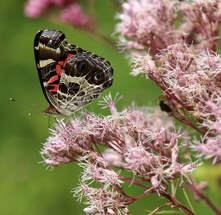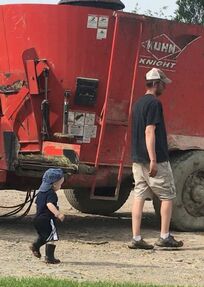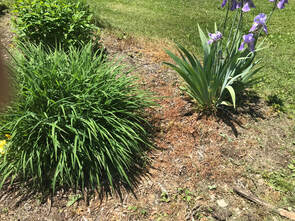CONSERVATION CORNER
A weekly blog for all things conservation
 Reprinted from Forest Fridays- a DCNR publication. by Ryan Reed, Natural Resource Program Specialist, Bureau of Forestry. Just a few years ago the topic of Colony Collapse Disorder (CCD) was at the forefront of natural science and media inquiry in Pennsylvania. CCD is the term applied to the sudden deaths of entire honeybee colonies, many of which are domesticated hives. The phenomenon of CCD portended the potential for massive losses of food production capability, as domesticated bees (through pollination) are responsible for a reported one-third of all the food we eat. CCD has no doubt affected food supplies and cost. Research points to multiple reasons for CCD, suggesting a synergistic effect between these factors, which include chemicals like insecticides and herbicides, parasitic mites and other pathogens, and loss of habitat.
0 Comments
 Reprint from Forest Fridays, DCNR newsletter. By: Ryan Reed, Natural Resource Program Specialist, Bureau of Forestry. The term “weed” has a very negative connotation in the eyes of most gardeners and horticulture professionals. Merriam-Webster defines a weed as “a plant that is not valued where it is growing.” I’ve spent countless hours, with many a subsequent back ache, pulling weeds in my gardens. They grow relentlessly it seems, and every spring I know the task begins anew.  By: Miranda Neville, Agricultural Resource Specialist Looking at the farmers in my life, some were born in to a seventh generation legacy while others chose to be first generation farmers but they all have one specific thing in common. No matter how long they have been farming they will spend their lives building their operation to create a legacy all their own. If (emphasis on ‘IF’) the day comes that they decide to retire or step back from farming, they want to be sure whoever takes the reigns will love and appreciate it just as they do. Finding someone who will take pride in what they do and who shares a passion for agriculture and their land is a rarity. So how does someone who spent their life cultivating their hopes and dreams (not to mention their life savings) ensure their legacy will live on?  By: Kevin Brown, BCCD, Ag Team Leader We had a meeting at the Fire Hall a couple weeks ago where we talked about no till gardening, stormwater control, rain barrels, rain gardens, pollinators, and the like. At the end of the meeting, one of the attendees came up to me and had a story about a neighbor spraying their “weeds”. It reminded me of a couple stories that I had that were very similar. His story went like this: He is a farmer and he uses herbicides. He has neighbors that have various opinions on sprays. We all do. He tries to be as conscientious as he can be with what he is using. He needs a license to use them, he has to go through training, and he knows any herbicide he is using as well as anyone can. He has a neighbor that is anti-Roundup to the max. Some people are. Is it media or facts? I don’t know, and it is not the reason for the article. For this person, sprays in general can be used, but Roundup is (insert your worst verb or pronoun here). As he was working his field one day, he witnesses his neighbor come out with their sprayer, fill it, go spray “weeds”, and come back to refill. They do this maybe 3-4 times before he decides he needs to go talk to this person. As he is asking about what they are doing, they tell him that “at least it is not Roundup!!!”. He asks to see what they are using, and how much. He informs them that the amount that they had already used probably could have done an entire field, not the little, tiny area that they had covered. The response was, “But I want it DEAD (GONE)!!!”. So, Roundup is bad, but putting 10x the amount of herbicide needed on an area is ok??? (And not the right spray for the job either) I have had the exact same conversation with other people, and I would be remiss if I didn’t share at least a couple of comments on this topic. |
AuthorsVarious staff at the Bradford County Conservation District Archives
July 2024
Categories
All
|
|
Bradford County Conservation District
Stoll Natural Resource Center 200 Lake Road, Suite E | Towanda PA 18848 Phone: (570)-485-3144 |
